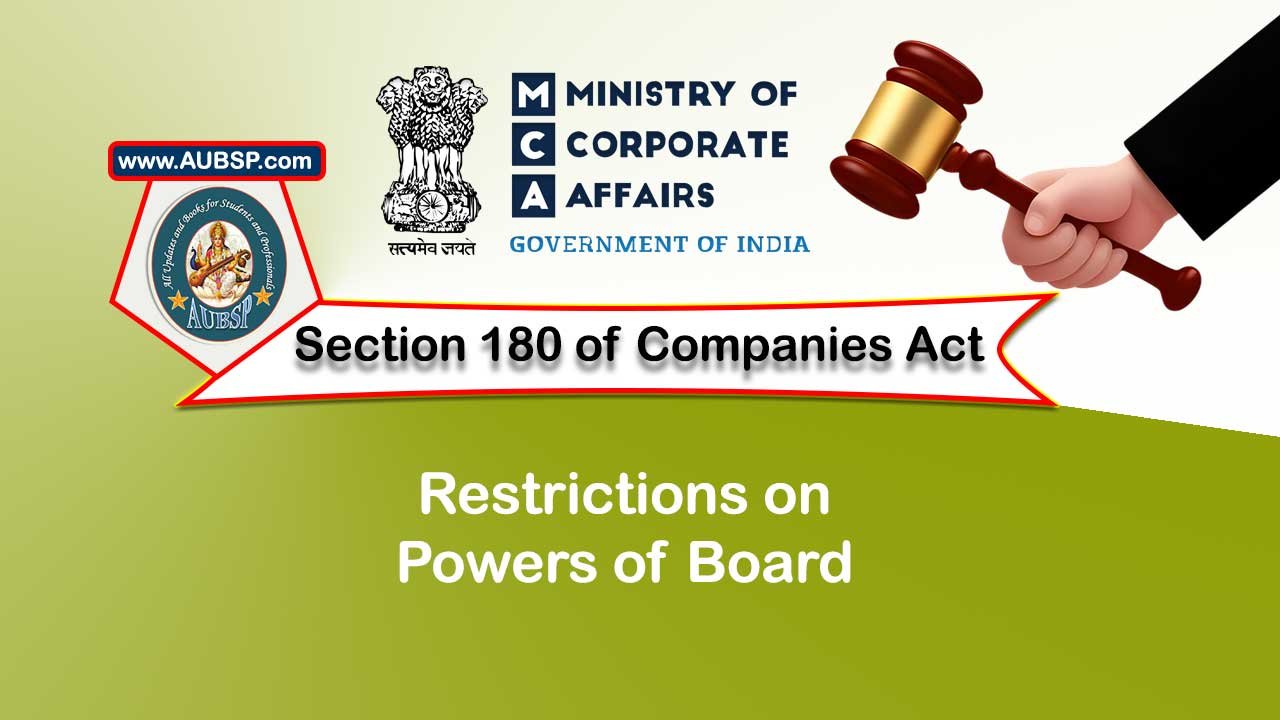Amended and updated notes on section 180 of Companies Act 2013. Detail discussion on provisions and rules related to restrictions on powers of Board.
Chapter XII (Sections 173–195) of the Companies Act, 2013 (CA 2013) deals with the provisions related to meetings of board and its powers. Section 180 of CA 2013 provides for restrictions on powers of Board.
Recently, we have discussed in detail section 179 (Powers of Board) of CA 2013. Today, we learn the provisions of section 180 of Companies Act 2013.
The provisions of section 180 are effective from 12-Sept-2013. You may refer Notification No. S.O. 2754(E) issued dated 12-09-2013. In this article, you will learn detail of the provisions of section 180 of the Companies Act 2013.
| Name of Act | The Companies Act 2013 |
|---|---|
| Enacted by | Parliament of India |
| Administered by | Ministry of Corporate Affairs (MCA) |
| Number of Chapters | 29 |
| Number of Sections | 484 (470-43+57) |
| Number of Schedules | 7 |
| You are reading: | |
| Chapter No. | XII |
| Chapter Name | Meetings of Board and its Powers |
| Section No. | 180 |
| Section Name | Restrictions on powers of Board |
| Monthly Updated Edition | Company Law PDF |
Section 180 of Companies Act 2013: Restrictions on powers of Board
Section 180 shall come into force on 12th September, 2013 vide Notification No. S.O. 2754(E) dated 12.09.2013.
(1) The Board of Directors of a company shall exercise the following powers only with the consent of the company by a special resolution, namely: —
(a) to sell, lease or otherwise dispose of the whole or substantially the whole of the undertaking of the company or where the company owns more than one undertaking, of the whole or substantially the whole of any of such undertakings.
Explanation: For the purposes of this clause, —
- (i) “undertaking” shall mean an undertaking in which the investment of the company exceeds twenty per cent. of its net worth as per the audited balance sheet of the preceding financial year or an undertaking which generates twenty per cent. of the total income of the company during the previous financial year;
- (ii) the expression “substantially the whole of the undertaking” in any financial year shall mean twenty per cent. or more of the value of the undertaking as per the audited balance sheet of the preceding financial year;
(b) to invest otherwise in trust securities the amount of compensation received by it as a result of any merger or amalgamation;
(c) to borrow money, where the money to be borrowed, together with the money already borrowed by the company will exceed aggregate of its paid-up share capital, free reserves and securities premium, apart from temporary loans obtained from the company’s bankers in the ordinary course of business:
Provided that the acceptance by a banking company, in the ordinary course of its business, of deposits of money from the public, repayable on demand or otherwise, and withdrawable by cheque, draft, order or otherwise, shall not be deemed to be a borrowing of monies by the banking company within the meaning of this clause.
Explanation: For the purposes of this clause, the expression “temporary loans” means loans repayable on demand or within six months from the date of the loan such as short-term, cash credit arrangements, the discounting of bills and the issue of other short-term loans of a seasonal character, but does not include loans raised for the purpose of financial expenditure of a capital nature;
(d) to remit, or give time for the repayment of, any debt due from a director.
(2) Every special resolution passed by the company in general meeting in relation to the exercise of the powers referred to in clause (c) of sub-section (1) shall specify the total amount up to which monies may be borrowed by the Board of Directors.
(3) Nothing contained in clause (a) of sub-section (1) shall affect—
- (a) the title of a buyer or other person who buys or takes on lease any property, investment or undertaking as is referred to in that clause, in good faith; or
- (b) the sale or lease of any property of the company where the ordinary business of the company consists of, or comprises, such selling or leasing.
(4) Any special resolution passed by the company consenting to the transaction as is referred to in clause (a) of sub-section (1) may stipulate such conditions as may be specified in such resolution, including conditions regarding the use, disposal or investment of the sale proceeds which may result from the transactions:
Provided that this sub-section shall not be deemed to authorise the company to effect any reduction in its capital except in accordance with the provisions contained in this Act.
(5) No debt incurred by the company in excess of the limit imposed by clause (c) of sub-section (1) shall be valid or effectual, unless the lender proves that he advanced the loan in good faith and without knowledge that the limit imposed by that clause had been exceeded.
Exception/ Modification/ Adaptation:
1) In case of Private company section 180 shall not apply. – Notification No. G.S.R. 464(E) dated 5th June, 2015.
2) In case of a Specified IFSC public company, shall apply in case of a Specified IFSC public company, unless the articles of the company provides otherwise. –Notification No. G.S.R. 08(E) dated 4th January, 2017


